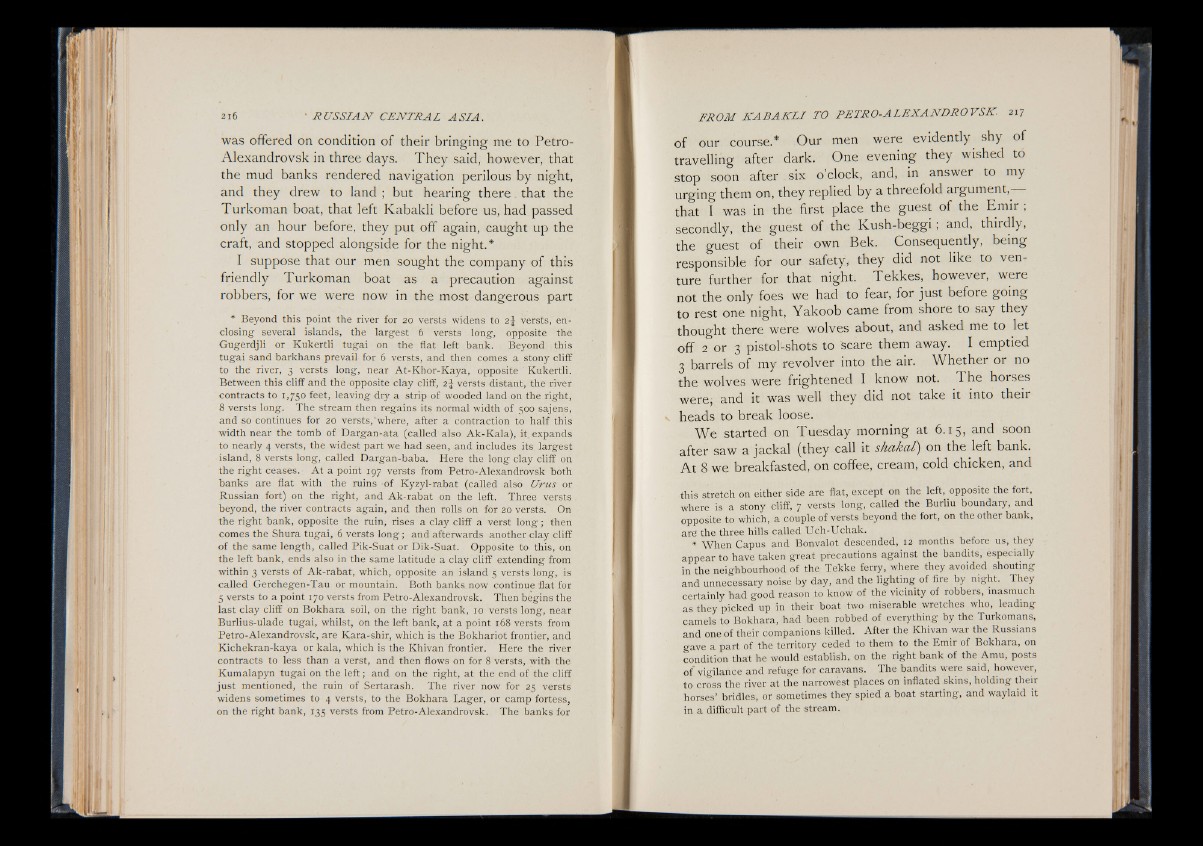
was offered on condition of their bringing me to Petro-
Alexandrovsk in three days. They said, however, that
the mud banks rendered navigation perilous by night,
and they drew to land ; but hearing th e re . that the
Turkoman boat, that left Kabakli before us, had passed
only an hour before, they put off again, caught up the
craft, and stopped alongside for the night.*
I suppose that our men sought the company of this
friendly Turkoman boat as a precaution against
robbers, for we were now in the most dangerous part
* Beyond this point the river for 20 versts widens to 2J versts, enclosing
several islands, the largest 6 versts long, opposite the
Gugerdjli or Kukertli tugai on the flat left bank. Beyond this
tugai sand barkhans prevail for 6 versts, and then comes a stony cliff
to the river, 3 versts long, near At-Kbor-Kaya, opposite Kukertli.
Between this cliff and thé opposite clay cliff, 2\ versts distant, the river
contracts to 1,750 feet, leaving dry a strip of wooded land on the right,
8 versts long. The stream then regains its normal width of 500 sajens,
and so continues for 20 versts,'where, after a contraction to half this
width near the tomb of Dargan-ata (called also Ak-Kala), it. expands
to nearly 4 versts, the widest part we had seen, and includes its largest
island, 8 versts long, called Dargan-baba. Here the long clay cliff on
the right ceases. At a point 197 versts from Petro-Alexandrovsk both
banks are flat with the ruins of Kyzyl-rabat (called also Urus or
Russian fort) on the right, and Ak-rabat on the left. Three versts
beyond, the river contracts again, and then rolls on for 20 versts. On
the right bank, opposite the ruin, rises a clay cliff a verst long ; then
comes the Shura tugai, 6 versts long ; and afterwards another clay cliff
of the same length, called Pik-Suat or Dik-Suat. Opposite to this, on
the left bank, ends also in the same latitude a clay cliff extending from
within 3 versts of Ak-rabat, which, opposite an island 5 versts long, is
called Gerchegen-Tau or mountain. Both banks now continue flat for
5 versts to a point 170 versts from Petro-Alexandrovsk. Then begins the
last clay cliff on Bokhara soil, on the right bank, 10 versts long, near
Burlius-ulade tugai, whilst, on the left bank, at a point 168 versts from
Petro-Alexandrovsk, are Kara-shir, which is the Bokhariot frontier, and
Kichekran-kaya or kala, which is the Khivan frontier. Here the river
contracts to less than a verst, and then flows on for 8 versts, with the
Kumalapyn tugai on the left ; and on the right, at the end of the cliff
just mentioned, the ruin of Sertarash. The river now for 25 versts
widens sometimes to 4 versts, to the Bokhara Lager, or camp fortess,
on the right bank, 135 versts from Petro-Alexandrovsk. The banks for
of our course.* Our men were evidently shy of
travelling after dark. One evening they wished to
stop soon after six o’clock, and, in answer to my
urging them on, they replied by a threefold argument,^
that I was in the first place the guest of the Emir ;
secondly, the guest of the K ush -beggi; and, thirdly,
the guest of their own Bek. Consequently, being
responsible for our safety, they did not like to venture
further for that night. Tekkes, however, were
not the only foes we had to fear, for just before going
to rest one night, Yakoob came from shore to say they
thought there were wolves about, and asked me to let
off 2 or 3 pistol-shots to Scare them away. I emptied
3 barrels of my revolver into the air. Whether or no
the wolves were frightened I know not. The horses
were; and it was well they did not take it into their
heads to break loose.
We started on Tuesday morning at 6.15, and soon
after saw a jackal (they call it shctkdl) on the left bank.
A t 8 we breakfasted, on coffee, cream, cold chicken, and
this stretch on either side are flat, except on the left, opposite the fort,
where is a stony cliff, 7 versts long, called the Burliu boundary, and
opposite to which, a couple of versts beyond the fort, on the other bank,
are the three hills called Uch-Uchak.
* When Capus and Bonvalot descended, 12 months before us, they
appear to have taken great precautions against the bandits, especially
in the neighbourhood of the Tekke ferry, where they avoided shouting
and unnecessary noise by day, and the lighting- of fire by night. They
certainly had good r.eason to know of the vicinity of robbers, inasmuch
as they picked up in their boat two miserable wretches who, leading
camels to Bokhara, had been robbed of everything by the Turkomans,
and one of their companions killed. After the Khivan war the Russians
gave a part of the territory ceded to them to the Emir of Bokhara, on
condition that he would establish, on the right bank of the Amu, posts
of vigilance and refuge for caravans. The bandits were said, however,
to cross the river at the narrowest places on inflated skins, holding their
horses’ bridles, or sometimes they spied a boat starting, and waylaid it
in a difficult part of the stream.